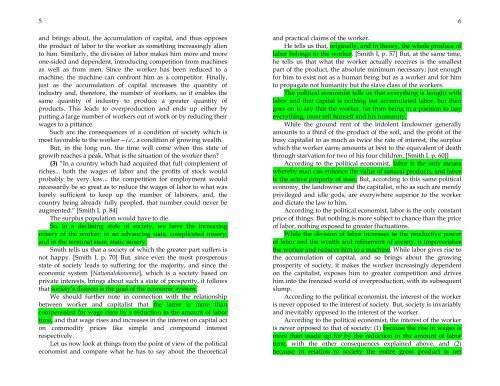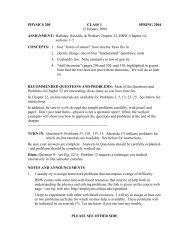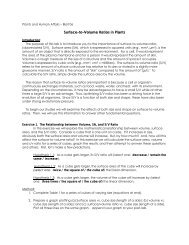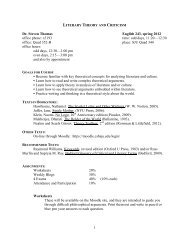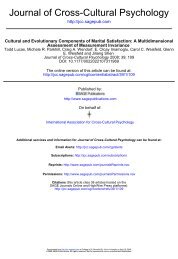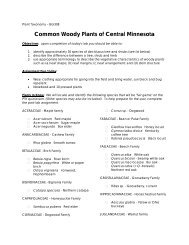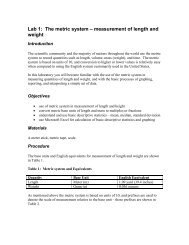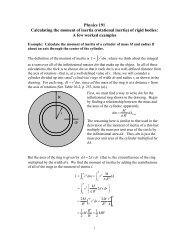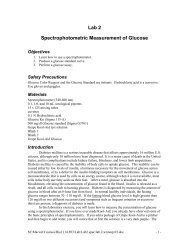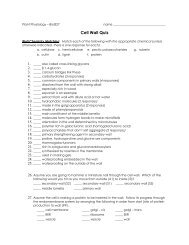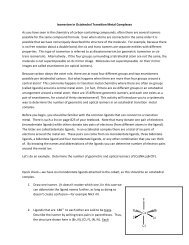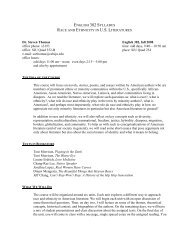Karl Marx Economic and Philosophical Manuscripts of 1844 Wages ...
Karl Marx Economic and Philosophical Manuscripts of 1844 Wages ...
Karl Marx Economic and Philosophical Manuscripts of 1844 Wages ...
Create successful ePaper yourself
Turn your PDF publications into a flip-book with our unique Google optimized e-Paper software.
5<strong>and</strong> brings about, the accumulation <strong>of</strong> capital, <strong>and</strong> thus opposesthe product <strong>of</strong> labor to the worker as something increasingly aliento him. Similarly, the division <strong>of</strong> labor makes him more <strong>and</strong> moreone-sided <strong>and</strong> dependent, introducing competition from machinesas well as from men. Since the worker has been reduced to amachine, the machine can confront him as a competitor. Finally,just as the accumulation <strong>of</strong> capital increases the quantity <strong>of</strong>industry <strong>and</strong>, therefore, the number <strong>of</strong> workers, so it enables thesame quantity <strong>of</strong> industry to produce a greater quantity <strong>of</strong>products. This leads to overproduction <strong>and</strong> ends up either byputting a large number <strong>of</strong> workers out <strong>of</strong> work or by reducing theirwages to a pittance.Such are the consequences <strong>of</strong> a condition <strong>of</strong> society which ismost favorable to the worker—i.e., a condition <strong>of</strong> growing wealth.But, in the long run, the time will come when this state <strong>of</strong>growth reaches a peak. What is the situation <strong>of</strong> the worker then?(3) “In a country which had acquired that full complement <strong>of</strong>riches... both the wages <strong>of</strong> labor <strong>and</strong> the pr<strong>of</strong>its <strong>of</strong> stock wouldprobably be very low... the competition for employment wouldnecessarily be so great as to reduce the wages <strong>of</strong> labor to what wasbarely sufficient to keep up the number <strong>of</strong> laborers, <strong>and</strong>, thecountry being already fully peopled, that number could never beaugmented.” [Smith I, p. 84]The surplus population would have to die.So, in a declining state <strong>of</strong> society, we have the increasingmisery <strong>of</strong> the worker; in an advancing state, complicated misery;<strong>and</strong> in the terminal state, static misery.Smith tells us that a society <strong>of</strong> which the greater part suffers isnot happy. [Smith I, p. 70] But, since even the most prosperousstate <strong>of</strong> society leads to suffering for the majority, <strong>and</strong> since theeconomic system [Nationalokonomie], which is a society based onprivate interests, brings about such a state <strong>of</strong> prosperity, it followsthat society’s distress is the goal <strong>of</strong> the economic system.We should further note in connection with the relationshipbetween worker <strong>and</strong> capitalist that the latter is more thancompensated for wage rises by a reduction in the amount <strong>of</strong> labortime, <strong>and</strong> that wage rises <strong>and</strong> increases in the interest on capital acton commodity prices like simple <strong>and</strong> compound interestrespectively.Let us now look at things from the point <strong>of</strong> view <strong>of</strong> the politicaleconomist <strong>and</strong> compare what he has to say about the theoretical<strong>and</strong> practical claims <strong>of</strong> the worker.He tells us that, originally, <strong>and</strong> in theory, the whole produce <strong>of</strong>labor belongs to the worker. [Smith I, p. 57] But, at the same time,he tells us that what the worker actually receives is the smallestpart <strong>of</strong> the product, the absolute minimum necessary; just enoughfor him to exist not as a human being but as a worker <strong>and</strong> for himto propagate not humanity but the slave class <strong>of</strong> the workers.The political economist tells us that everything is bought withlabor <strong>and</strong> that capital is nothing but accumulated labor, but thengoes on to say that the worker, far from being in a position to buyeverything, must sell himself <strong>and</strong> his humanity.While the ground rent <strong>of</strong> the indolent l<strong>and</strong>owner generallyamounts to a third <strong>of</strong> the product <strong>of</strong> the soil, <strong>and</strong> the pr<strong>of</strong>it <strong>of</strong> thebusy capitalist to as much as twice the rate <strong>of</strong> interest, the surpluswhich the worker earns amounts at best to the equivalent <strong>of</strong> deaththrough starvation for two <strong>of</strong> his four children. [Smith I, p. 60]]According to the political economist, labor is the only meanswhereby man can enhance the value <strong>of</strong> natural products, <strong>and</strong> laboris the active property <strong>of</strong> man. But, according to this same politicaleconomy, the l<strong>and</strong>owner <strong>and</strong> the capitalist, who as such are merelyprivileged <strong>and</strong> idle gods, are everywhere superior to the worker<strong>and</strong> dictate the law to him.According to the political economist, labor is the only constantprice <strong>of</strong> things. But nothing is more subject to chance than the price<strong>of</strong> labor, nothing exposed to greater fluctuations.While the division <strong>of</strong> labor increases to the productive power<strong>of</strong> labor <strong>and</strong> the wealth <strong>and</strong> refinement <strong>of</strong> society, it impoverishesthe worker <strong>and</strong> reduces him to a machine. While labor gives rise tothe accumulation <strong>of</strong> capital, <strong>and</strong> so brings about the growingprosperity <strong>of</strong> society, it makes the worker increasingly dependenton the capitalist, exposes him to greater competition <strong>and</strong> driveshim into the frenzied world <strong>of</strong> overproduction, with its subsequentslump.According to the political economist, the interest <strong>of</strong> the workeris never opposed to the interest <strong>of</strong> society. But, society is invariably<strong>and</strong> inevitably opposed to the interest <strong>of</strong> the worker.According to the political economist, the interest <strong>of</strong> the workeris never opposed to that <strong>of</strong> society: (1) because the rise in wages ismore than made up for by the reduction in the amount <strong>of</strong> labortime, with the other consequences explained above, <strong>and</strong> (2)because in relation to society the entire gross product is net6


